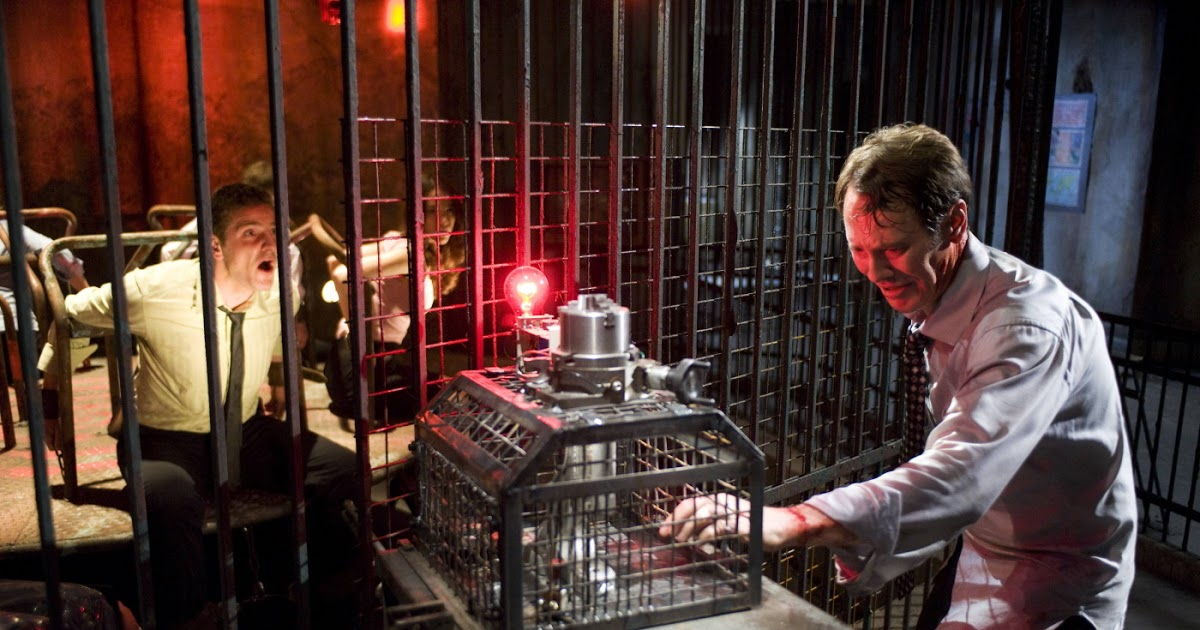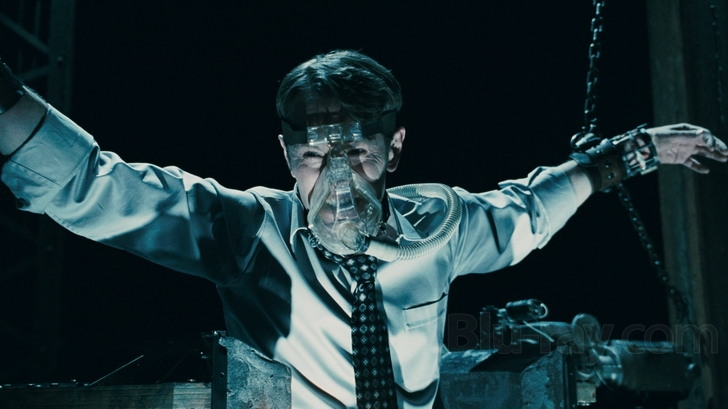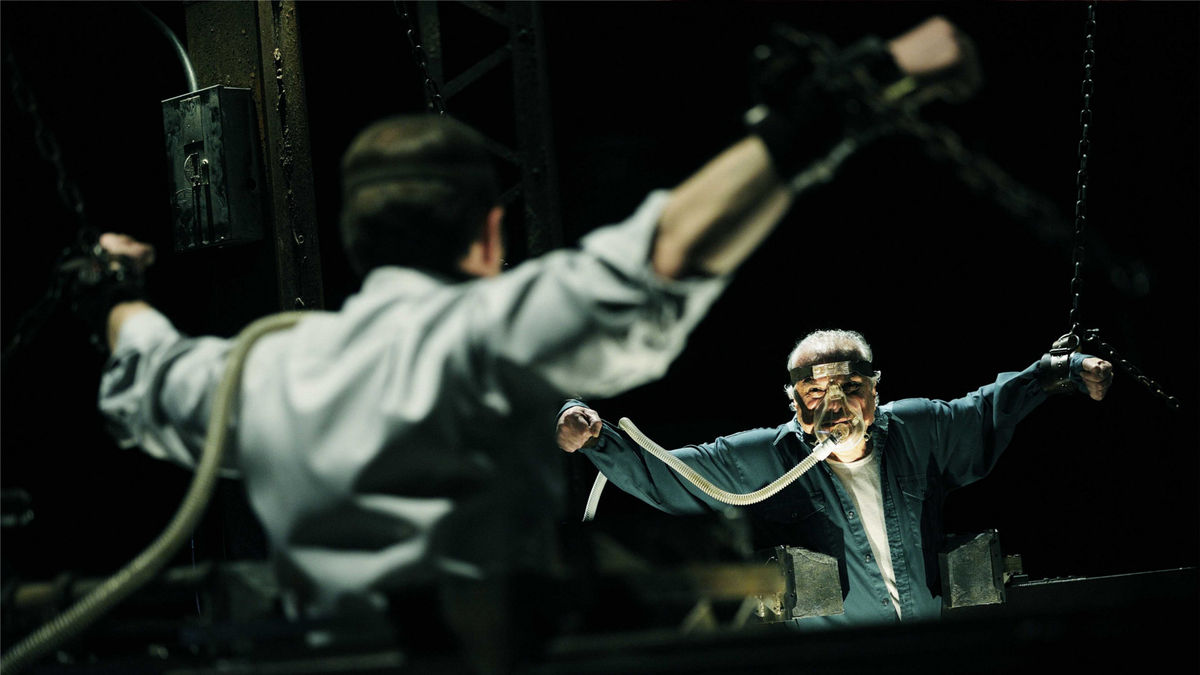
It was Halloween at Sarah Lawrence College, and more than 100 undergraduates had gathered to discuss the ethics of murdering health insurance executives.
The year was 2023, fourteen years after the release of Saw VI, a famous horror movie in which a group of serial killers (Tobin Bell, Costas Mandylor) torture and otherwise take revenge upon greedy health insurance executives (Peter Outerbridge, Shawn Mathieson). Coincidentally the lecture took place slightly more than one year before Brian Thompson, a real-life CEO of the health insurance company UnitedHealth, would be gunned down in Midtown Manhattan, allegedly by data engineer and spondylolisthesis sufferer Luigi Mangione.
No one assembled that Halloween had any clue that the event would one day become grimly prophetic. Director Kevin Greutert and myself, a Salon Magazine staff writer who frequently writes about Saw VI, were there merely to give an overdue academic treatment to a cult classic for the students of a small, prestigious Westchester County, NY liberal arts college. Yet at one point, when explaining why Saw VI has stood the test of time, I referred to a pair of psychological concepts— schadenfreude and genugtuung—that would one day explain the public’s celebratory response to the future homicide.
“Schadenfreude is enjoying when something bad happens to someone, but not necessarily a person who deserves it, like if someone slips and falls,” I said. “But if an evil health insurance executive who ruins lives gets destroyed by hydrofluoric acid, that’s genugtuung, because that is something happening to a person who deserves it!”

Flash forward to the aftermath of the Thompson shooting. Greutert was at his dentist’s office and his oral hygienist, who had no idea he was the director of Saw VI, casually expressed the hope that the shooting might lead to improvements in America’s unequal and unjust health care system.
“She said to me very earnestly, ‘Do you think this is going to change things?’” Greutert recalled. “I said, ‘I kind of doubt it. I don’t know what will change things.”
If there is one thing Greutert knows for certain, it is that extrajudicial violence like vigilante murder cannot make things better. It will only make them worse.
“I don’t think that this kind of violence is going to change things ever unless literally everybody dies,” Greutert said. “You’ve got these corporate CEOs across a range of businesses. How much do they genuinely care and how much are they just balkanizing their fortresses and drone patrolling their mansions?”
Aside from encouraging business leaders to beef up their personal security, without any benefit to the ordinary consumer, Greutert worried that acts of violence like the Thompson shooting will play into the hands of right-wing authoritarians like President-elect Donald Trump.
“For a long time I have feared a rise in extra-judicial killings and assassinations in the US,” Greutert said. “It will truly break America if this kind of thing becomes more commonplace. If that starts to happen, it will play right into the hands of bad guys who want to create laws to gather more power. We don’t want to give them the excuse to do it.”

The author of this article, who in September was called “disgusting” by Trump’s press secretary Karoline Leavitt for making similar observations to Greutert’s, emphatically agreed with Greutert as he expressed this concern. Yet both Greutert and I also agree that there is an important difference between encouraging murder and trying to understand people who suffer from injustices and feel catharsis when they perceive karma being done to culpable wrongdoers. This is why so many people on social media have specifically mentioned Saw VI in response to the Thompson shooting. Saw VI poignantly expressed the valid frustrations that millions feel with American health care, perhaps most memorably in a scene that illustrates these points through dialogue instead of gore.
“Did you know that in the Far East, people pay their doctors when they’re healthy?” the Jigsaw Killer (Bell) tells CEO William Easton (Outerbridge) during a key character moment. “When they’re sick, they don’t have to pay them. So basically, they end up paying for what they want, not what they don’t want.”
He adds, “We got it all ass-backwards here. These politicians, they say the same thing over and over and over again; ‘Healthcare decisions should be made by doctors and their patients, not by the government.’ Well, now I know they’re not made by doctors and their patients or by the government. They’re made by the fucking insurance companies.”
It is tragic that these criticisms, instead of being distant memories today, are as relevant now as when they first hit the screen in 2009. Because so many people languish and die because of insurance companies, people understandably want to see justice done in any form, even methods that are inherently unjust in themselves. The danger in this, Greutert noted, is that it risks dehumanizing those who otherwise hold humanitarian values.
“I think about this all the time,” Greutert said, turning to Russia’s invasion of Ukraine for another example of an injustice that can provoke highly emotional responses. “Right now there are something like 10,000 North Koreans that Kim Jong-un has thrown into Vladimir Putin’s hands to do with as he pleases. There have been friendly fire incidents where the North Korean soldiers have killed Russians. And yesterday I was reading that North Koreans don’t even know about drones, and they’re being sent out on the front lines and are completely helpless, and part of it is a lack of translators between Russian and Korean.”

Yet even though Greutert and I despise Putin and support Ukraine (which is being led by another liberal political artist, President, and erstwhile comedian Volodomyr Zelenskyy), that does not mean we think it is a good idea to celebrate the hardships that befall the bad guys.
“It’s chaos,” Greutert said. “I can’t stand Putin, and this war is completely wrong. Is it right to gloat, though, over the hardship that’s faced by people who are probably innocent? It is wrong, but on the other hand, I’m sure I’m not alone in sometimes thinking anything that can go wrong for Putin is all right with me. So it’s very complex.”
At the same time, Greutert is highly flattered that Saw VI is receiving more attention because of the murder, and agrees that if nothing else the mass genugtuung that occurred after the UnitedHealth shooting is a testament to the film’s enduring power. Indeed, Greutert was reminded of this fact as soon as he learned about the shooting on the day it happened.
“I was just reading ‘The Washington Post’ on my exercise bike when I heard about Brian Thompson’s killing, and I instantly thought of Saw VI,” Greutert recalled. He thought about the research he had done on the injustices committed by health insurance executives against their customers, such as creating algorithms to decide who lives and who dies. The cruel irony did not escape him as his phone began blowing up with texts from friends who had the same instant reaction to the shooting as himself.
I know this because I was one of those friends. While this isn’t what I wrote to Greutert, a different text best sums up the general reaction:
“People started texting me saying, ‘Oh my God, your movie just came true,’” Greutert said.
Categorized:Editorials

